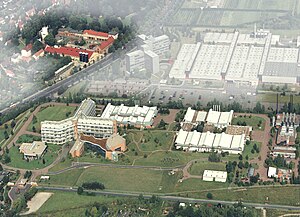By Paul Canning
Update 2 October: About 30 LGBT activists
held a flashmob yesterday, stopping traffic for a few minutes on a main Belgrade street holding a 'Ljubav. Normalno' ('Love. Normal') banner. They were protected by riot police who have been deployed onto Belgrade streets yesterday and today.
Those opposed to the Gay Pride march are declaring a "a victory of family values" and a "victory of Serbian patriots."
Serbian politicians have reacted angrily to comment that they had capitulated to violent anti-gay forces. Human and Minority Rights Minister Milan Marković
told B92:
“It’s far from the truth that the state has capitulated and that hooligans are more powerful than the state, that’s complete nonsense.”
Serbian parliament Speaker Slavica Đukić-Dejanović says Serbia has met all the conditions for the EU candidate status, expected 12 October, as bans on Pride marches were not 'set as a condition for other countries on their EU paths either'. There are
other reasons why Serbia's EU bid may stay on hold, but, wrote The Economist:
"Its ban makes it look feeble and unwilling to stand up to threats from violent extremists. If the government can’t even ensure a peaceful Gay Pride march in its capital, goes the logic, how can it be ready to join the EU?"
Interior Minister Dačić said that when informed of the decision to ban all gatherings, including the Pride march, Western diplomats 'understood'. Western embassies
were reportedly on a hit list for those planning to riot.
Update: The March
has been banned. Interior Minister Dačić said:
“Police cannot support holding of all this gatherings for security reasons, because there will be clashes, victims, blood and we will end up a huge chaos.”
B92 said that police security assessments showed that extremists were planning on creating disturbances in several parts of Belgrade in order to weaken police forces, burning down ruling coalition parties’ headquarters.
Early reaction from Members of the European Parliament is not good.
Ulrike Lunacek MEP, Co-President of the
LGBT Intergroup of the parliament and substitute member of the South Eastern Europe delegation, reacted:
“I deeply regret that Serbian citizens will not be able to march for tolerance, acceptance and equality on Sunday. Serbian authorities have a duty to care for everyone’s safety, but it is profoundly disturbing that the leadership of a country seeking EU candidate status and membership—supported by a majority in the European Parliament—feel incapable of providing such safety for all citizens.”
“The government has to be much, much stricter towards extremists whipping up violence in the country . A society that cannot express itself for fear of violence is not a free, democratic society.”
Jelko Kacin MEP, European Parliament Rapporteur for Serbia’s accession and member of the LGBT Intergroup, and who is in Belgrade for the march, added:
“The decision to ban Pride Parade is a sovereign decision of the Serbian Government and the National Security Council. I receive such a decision with deep regret; as a matter of fact, it deprives citizens of the constitutional and legal right to free expression and peaceful assembly. A state seeking to access the EU must guarantee the human rights of its citizens.”
ILGA-Europe said it "will bring it to the attention of the relevant officials of the European institutions to take further actions."
"This is a defeat for all citizens of Serbia: today, it's the gays, tomorrow, God knows which minority group," organiser Goran Miletic told reporters.
--
Serbian Interior Minister Ivica Dačić and
the Mayor of Belgrade are calling for the cancellation of Sunday's Gay Pride march in Belgrade.
Numerous far-right, nationalist, fascist and Orthodox groups are planning counter-demonstrations and
police have discovered that one right-wing group is using the codename "Belgrade in flames" for their operation against Gay Pride.
The 2010 parade attracted 600 people - and 20,000 opponents, who rioted resulting in many arrests and injuries. Numerous Facebook groups were set up with memberships in the tens of thousands which threatened to murder gays and their supporters. The leader of the nationalist organization Obraz, Mladen Obradovic, received a prison sentence for organising the violent counter demonstrations but this hasn't happened and he is organising counter demonstrations for Sunday.
The Police Union
has also called for the gay pride march and counter-demonstrations to all be banned - over 100 of their members were injured last year.
According to SAPA:
The authorities can ban a scheduled public gathering up to 12 hours before it is due to start. The Daily Press wrote: “Chances are strong that Dačić will ban the parade and all other events” - those being four anti-gay demonstrations also planned for the weekend.
Pride Parade Organizing Committee member Goran Miletić
told B92:
“The Pride Parade Organizing Committee will not call off the parade and believes that Mayor Đilas’ statement is completely shocking, bearing in mind that he put an equal sign between all the events announced for the weekend. I have to remind you that the announced rallies are those of the organizations that organized violence last year and whose leaders were convicted of the violence.”
According to a
post on the march organisers website a 'secret meeting' was held at the German Embassy in Belgrade where it was agreed that the march should go ahead "at all costs"
"The meeting was attended by the ambassadors of Western countries, the top of the Serbian Interior Ministry, representatives of OSCE and the LGBT population, and similar meetings in previous days have been held in the British and the Polish Embassy."
An American attending the march told us that:
"Groups of neo-nazis and fascist extremists can already be seen at the airport and walking the streets of Beograd."






















![Reblog this post [with Zemanta]](http://img.zemanta.com/reblog_e.png?x-id=46cf50f6-176e-4d41-8861-931d15f9bcd0)





 Join our page
Join our page

